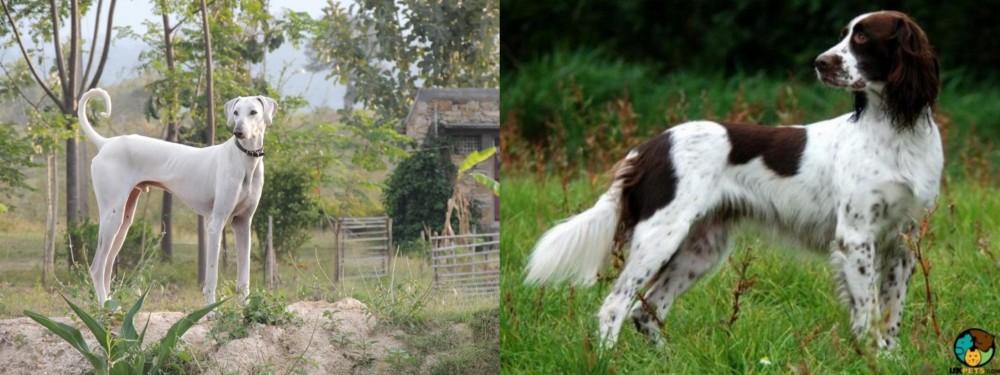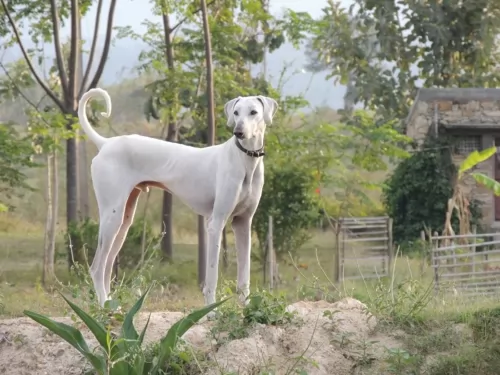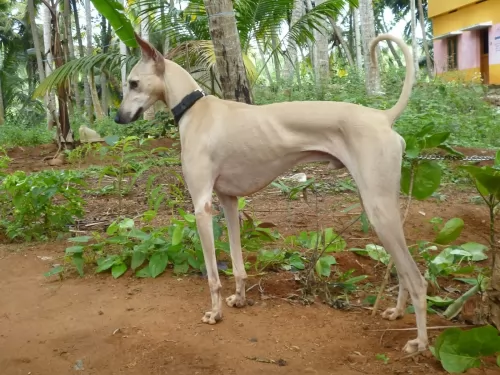 Petzlover
Petzlover Chippiparai is originated from India but French Spaniel is originated from France. Both Chippiparai and French Spaniel are of same height. Both Chippiparai and French Spaniel are having almost same weight. Chippiparai may live 3 years more than French Spaniel. Chippiparai may have less litter size than French Spaniel. Chippiparai requires Low Maintenance. But French Spaniel requires Moderate Maintenance
Chippiparai is originated from India but French Spaniel is originated from France. Both Chippiparai and French Spaniel are of same height. Both Chippiparai and French Spaniel are having almost same weight. Chippiparai may live 3 years more than French Spaniel. Chippiparai may have less litter size than French Spaniel. Chippiparai requires Low Maintenance. But French Spaniel requires Moderate Maintenance
 The Chippiparai is a working dog found in India and until recently there has been little interest in the purity of any breed, but rather only an emphasis on the abilities of the dog. They are only beginning to research the origin and history of their native dogs such as the Chippiparai. Not much is known about the origin of the breed except that it is found almost exclusively in Tamil Nadu and Keraia in the southern part of the subcontinent of India. Other than this there is much speculation about the breed’s origin but very little-known facts. It is indeed an ancient breed; however, its origin could be thousands of years ago or simply hundreds of years ago.
The Chippiparai is a working dog found in India and until recently there has been little interest in the purity of any breed, but rather only an emphasis on the abilities of the dog. They are only beginning to research the origin and history of their native dogs such as the Chippiparai. Not much is known about the origin of the breed except that it is found almost exclusively in Tamil Nadu and Keraia in the southern part of the subcontinent of India. Other than this there is much speculation about the breed’s origin but very little-known facts. It is indeed an ancient breed; however, its origin could be thousands of years ago or simply hundreds of years ago.
• Perhaps it is a descendant of the Saluki as it resembles this breed quite a bit. It has been believed for some time that the Saluki is the original sighthound and the source of all sighthound breeds. The Saluki was very popular in the Middle East, especially in Persia and Arabia from which it could easily have spread to India. It would then have been shared from Northern India to Southern India where the Chippiparai is found.
• Perhaps the Chippiparai is a descendent of sighthounds from Central Asia and Afghanistan – the Tazi, Taigan, Hortaya Borsaya or the Afghan Hound. This part of Central Asia had more trade, influence and contact with the Indian subcontinent early in their history than with any other region. The Chippiparai is considered by some to be more like these sighthounds than like the Saluki and the interaction between these regions has a much longer history than the Middle East and India.
• It is also speculated that the Chippiparai might have been developed completely and uniquely from the local street and working dogs. With the civilization of India being one of the oldest in the world, it is considered a possibility that the Chippiparai is the descendent of the Harappan hunting dogs that probably were developed by the Indus Valley or Harappa roiling class.
Wherever the Chippiparai came from, they were the exclusive property of the wealthy and ruling castes. These upper castes were the only ones that could legally hunt with dogs or afford to feed one. The royal classes of Tiruneivell, Thanjavur, and Madurai all fed the popularity of the breed among the upper castes. They were coursing dogs used to chase down the prey once it was sighted. The Chippiparai are incredibly fast runners and would catch almost any prey and either hold it or kill it for their hunter. The Chippiparai, when not hunting, had to be chained so they would not chase any small animal that they saw. This confinement also added to the purity of the breed as random breeding was prevented.
The southern part of the Indian subcontinent is extremely hot with routine temperatures over 100’. The Chippiparai was developed to withstand these extreme temperatures and is more heat tolerant than most any other breed. They also need very little food and are resistant to the many parasites and diseases found in southern India.
Harboring the belief that Indian dogs were not as good as European ones, the occupying countries of Portugal, France, and Britain, had no interest in the Chippiparai, again leaving the breed to develop naturally on their own with little or no interbreeding. They also received no formal recognition because Indian culture only valued the dog for its working abilities. There was no Indian Kennel Club until 1956.
The Chippiparai is now very rarely and only found in the area of its birth. Many believe the breed is in danger of becoming extinct and even though it is now registered with Indian Kennel Clubs it is not often shown in their dog shows. Lovers of the breed are now attempting to get Indians to recognize that the Chippiparai is a great companion animal and attempting to save the breed.
 Developed in France and then in Canada, the French Spaniel is a descendent of 14th century hunting dogs. Originally the breed was very popular with the French royalty and nobility at the Court of Versailles, in the Middle Ages. A French Spaniel named Babe was owned by Catherine I of Russia.
Developed in France and then in Canada, the French Spaniel is a descendent of 14th century hunting dogs. Originally the breed was very popular with the French royalty and nobility at the Court of Versailles, in the Middle Ages. A French Spaniel named Babe was owned by Catherine I of Russia.
Spaniels were mentioned in Gaston III of Foix-Beams’ The Master of the Game, or Livre de Chasse, in 14th Century France. Most believed that Spaniels had been developed during the 11th century Crusades. By 1650 the French Spaniel was differentiated from the King Charles Spaniel and determined to be its own type of spaniel.
In 1805, they were featured in the Sporting Magazine, hunting mallards. The French Spaniel was crossed with English Setters in the !850’s to develop the French Brittany (Spaniel). But by the end of the 19th century, hunting dogs from other countries were outpacing the French Spaniel so much that it was driven to the brink of extinction. Fortunately, a priest named Father Fournier saved the breed by taking all remaining Spaniels to his kennels at St. Hillarie and developing the lines we see in the breed today. This was followed by the founding of the French Spaniel Club in 1921. The various lines of the Spaniels included the French Spaniel of today, the Brittany of today, the Blue Picardy and the Picardy.
The French Spaniel however has been rare outside of its native country and Canada, where it was imported in the 1970’s to French speaking Quebec. Quebec Canadians fell in love with the breed for hunting grouse and woodcock. In order to ensure that the breed would be continued in line with its French standards, the Club de l’Epagneul Francais du Canada began in 1978. By 1985 the Canadian Kennel Club recognized the French Spaniel. Soon after they were recognized by the United Kennel Club, the Federation Cynoloqique Internationale, the UK Kennel Club and the North American Versatile Hunting Dog Association, but not the AKC (American Kennel Club). They are also registered with organizations such as the American Canine Association, the Dog Registry of America and the America’s Pet Registry. They have been included in the AKC Foundation Stock Service as the first step toward AKC recognition.
 The Chippiparai is a typical sighthound although their size and appearance will vary more than that of registered purebred sighthounds. Typically, they will have a long, domed head with small erect ears and dark eyes. Their muzzle will be as deep and wide as the skull but longer. Their legs are straight and long, their chest is roached back and deep, giving them, an appearance very similar to a greyhound or other sighthound.
The Chippiparai is a typical sighthound although their size and appearance will vary more than that of registered purebred sighthounds. Typically, they will have a long, domed head with small erect ears and dark eyes. Their muzzle will be as deep and wide as the skull but longer. Their legs are straight and long, their chest is roached back and deep, giving them, an appearance very similar to a greyhound or other sighthound.
They have a long curly tail, and their coat can vary greatly in color. They are medium sized, and their coat is short, shiny and close. He is very slender and sleek, which along with his long legs gives him that incredible speed. They are thin with visible ribs.
 The French Spaniel is a very tall dog and as such is one of the spaniel breeds two tallest. They are taller than the English Springer Spaniel, have a deep chest and a muscular build. Their legs are very strong, and they have a thick tail that is never docked. It is long, slightly curved and hangs low. He is an elegant dog with dark amber eyes, long feathery ears, and a nose the color of the coat. If the coat is brown the nose is brown. If the coat is black and white the nose is black. Most French Spaniels are white with brown or dark liver or white with black.
The French Spaniel is a very tall dog and as such is one of the spaniel breeds two tallest. They are taller than the English Springer Spaniel, have a deep chest and a muscular build. Their legs are very strong, and they have a thick tail that is never docked. It is long, slightly curved and hangs low. He is an elegant dog with dark amber eyes, long feathery ears, and a nose the color of the coat. If the coat is brown the nose is brown. If the coat is black and white the nose is black. Most French Spaniels are white with brown or dark liver or white with black.
 The Chippiparai is a loving, gentle family dog if well socialized, well trained and well exercised. They are very intelligent and need human companionship. Once they are living with a human family, they are very protective of that family. They are for the most part peaceful and quiet dogs. They are loyal and loving but they are not overly affectionate. Cuddlers they are not, and they do not like to play rough with children.
The Chippiparai is a loving, gentle family dog if well socialized, well trained and well exercised. They are very intelligent and need human companionship. Once they are living with a human family, they are very protective of that family. They are for the most part peaceful and quiet dogs. They are loyal and loving but they are not overly affectionate. Cuddlers they are not, and they do not like to play rough with children.
Accepting and loving within the family, the Chippiparai are equally hesitant and shy around strangers. They can be suspicious, but they are not aggressive. They are just very aloof with strangers, yet they hardly ever bark.
 There are no clinical studies regarding the health and health history of the Chippiparai, so little is known about their long-term health. However, most who know the breed, believe it is an incredibly healthy one. They seem to have a lot less genetically transmitted health issues than other purebreds. Because of their isolation for centuries in India, they have developed immunities and resistance to most parasites and diseases other dog suffer from.
There are no clinical studies regarding the health and health history of the Chippiparai, so little is known about their long-term health. However, most who know the breed, believe it is an incredibly healthy one. They seem to have a lot less genetically transmitted health issues than other purebreds. Because of their isolation for centuries in India, they have developed immunities and resistance to most parasites and diseases other dog suffer from.
Because of this you should look for the types of issues that occur in dogs of this size and build. Have them tested by the Canine Eye Registration Foundation and the Orthopedic Foundation for Animals.
 The French Spaniel is a healthy breed that adapts well to all types of conditions, especially wet ones. There are some potentially serious health issues that the breed may be susceptible to:
The French Spaniel is a healthy breed that adapts well to all types of conditions, especially wet ones. There are some potentially serious health issues that the breed may be susceptible to:
This is a very serious inherited disorder. It is one of many Hereditary Sensory Autonomic Neuropathies (HSN) disorders. This is an agonizing infliction that causes the dogs to have no pain in certain extremities and therefore the ability to self-mutilate their feet, pads, claws and digits. They lick and bite their feet often amputating footpads, claws, and digits without feeling any pain. This leads to infection and most dogs end up being euthanized. The disorder shows up by 3-4 months of age.
Make sure the dog’s ears are cleaned regularly to remove wax and prevent infections.
This disease causes seizures but can be treated with medication.
Can cause lameness and arthritis.
 Do not overfeed your Chippiparai. Feed twice a day and no more than a total of 2.5 cups of high quality dry food.
Do not overfeed your Chippiparai. Feed twice a day and no more than a total of 2.5 cups of high quality dry food.
As mentioned previously the Chippiparai seems to have no genetic diseases or issues and very few acquired ones. However, he is sensitive to anesthesia and some foods. He is intolerant to cold weather and has a hard time with his pads on hard surfaces. Some Chippiparai might experience some of the ailments other breeds like them experience.
Both Elbow and hip are possible. This can cause arthritis and lameness. This occurs when the bone does not fit well into the joint.
This can cause lameness as well. The kneecaps slide over the knee instead of staying in place.
This is a hunting dog and he will want to hunt. They are incredibly fast and need the opportunity to run. Brisk walks will not be enough for this dog. He is very energetic. They will chase any small animals. It is not recommended that you have small pets even small dogs or cats with a Chippiparai. Having been bred for centuries to hunt, they are not likely to respond to any commands if they are off lease and chasing prey. Do not allow them to be off leash unless in a fenced area, and that fence needs to be 8 feet tall as they can easily jump a seven-foot fence. Try they at coursing, agility, fly ball and frisbee competitions.
 A high quality dry food made for puppies and if possible for Spaniels. Feed two to three times a day about one fourth of a cup each time
A high quality dry food made for puppies and if possible for Spaniels. Feed two to three times a day about one fourth of a cup each time
A high quality adult dry food made for Spaniels if possible. Feed twice a day about one half to three fourths of a cup at each meal.
Excellent vision, stamina and speed.
These dog love to run and play. They are smart and learn easily. They like to chase balls, swim, play hide and seek, Find It, and go hiking. They can excel at learning tricks, agility, rally and obedience trials.